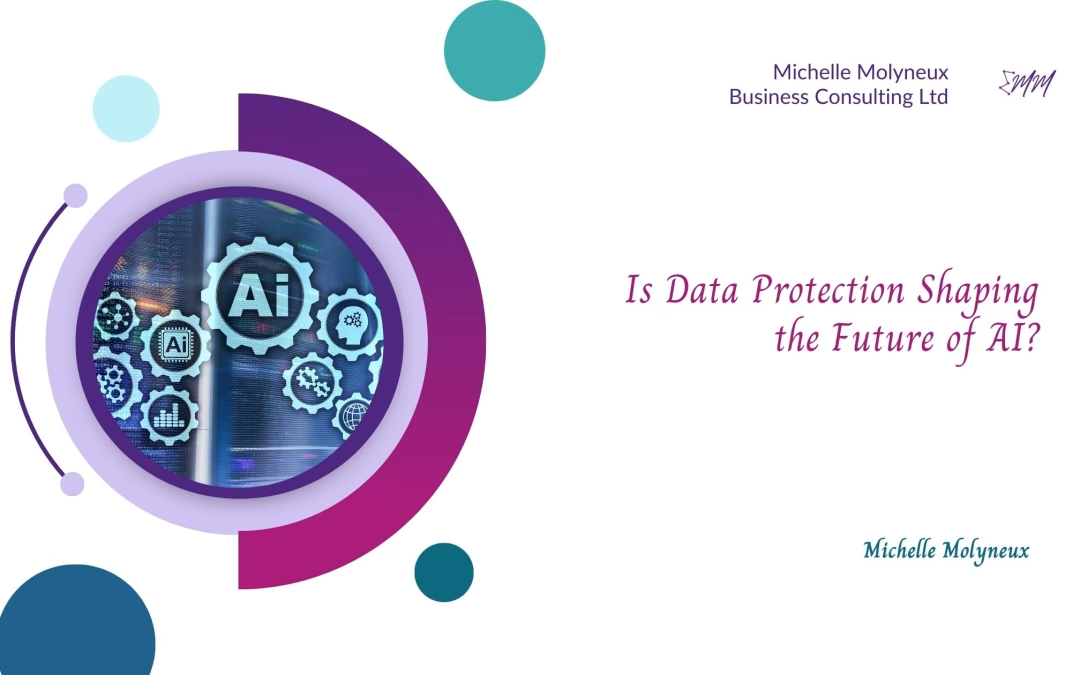A hot topic is AI and how it can help a small business. There is no doubt about its uses. In this article, I wanted to look at how it can be used to its full potential AND within the regulations. Data protection laws are designed to protect individuals’ personal information, ensuring it is used responsibly and securely. I will not say I don’t use AI; that would be a lie. I use it for ideas and brainstorming.
I was recently reading an article from Forbes.com on how small businesses use AI, and it got me thinking about the benefits of using AI and ensuring we are using it compliantly. Any use of AI must comply with data protection regulations, regardless of business size. The regulations do not stop you from using it; they direct its use and ensure you meet the GDPR principles.
Let’s explore how data protection impacts AI in several key areas:
Accountability and Governance
Accountability is a cornerstone of data protection laws. For AI systems, this means:
- Documentation: Keeping detailed records of AI systems, including their design, development, and deployment processes.
- Audits and Reviews: Regularly auditing AI systems to ensure they comply with data protection laws and make necessary adjustments based on audit findings.
Ensuring Transparency
Transparency is essential to build user trust and comply with data protection regulations. This involves:
- Clear Explanations: Providing understandable explanations of how AI systems make decisions.
- User Communication: Informing users when interacting with an AI system and explaining how their data will be used.
- Updating privacy notices: Informing people how you use it concerning processing personal data.
Lawfulness
Lawfulness requires that all data processing activities, including those involving AI, have a legal basis:
- Data Processing Grounds: Ensuring a lawful basis for data processing, such as obtaining user consent or demonstrating a legitimate interest.
- Compliance Monitoring: Continuously monitor AI systems to ensure compliance with relevant laws and regulations.
Accuracy and Statistical Accuracy
Accuracy is vital to ensure AI systems produce reliable and trustworthy results:
- Data Quality: Using high-quality and relevant data for training AI models.
- Regular Validation: Continuously validating AI outputs to maintain accuracy and reliability.
Ensuring Fairness
Fairness in AI means preventing discrimination and bias in automated decision-making:
- Bias Detection and Mitigation: Implementing measures to identify and reduce biases within AI systems.
- Equal Treatment: Ensuring AI systems treat all individuals fairly and do not discriminate based on protected characteristics.
Security and Data Minimisation
Security involves protecting personal data from unauthorised access and breaches, while data minimisation means only collecting data necessary for specific purposes:
- Robust Security Measures: Implementing strong security protocols to protect data processed by AI systems.
- Minimal Data Collection: Limiting data collection to what is necessary for the AI system to function effectively.
EnsuringIndividuals’’ Rights
Respecting individuals’’ rights under data protection laws is crucial when using AI:
- Data Access and Control: Providing individuals with access to their data and the ability to correct or delete it.
- Right to Object: Allowing individuals to object to automated decision-making and profiling processes.
Practical Applications of AI in Compliance
Chatbots and Virtual Assistants
Many small businesses are adopting AI-powered chatbots to improve customer service. These tools must also comply with data protection laws by:
- Encrypting Conversations: Ensuring all data shared via chatbot is encrypted and secure.
- Providing Information: Offering instant responses to customer queries about data protection policies and practices.
Automation Tools
AI can automate routine tasks, enhancing efficiency and ensuring compliance:
- Data Entry: Automating data input reduces human error and ensures data accuracy.
- Monitoring and Alerts: Using AI to monitor for data breaches and promptly alert relevant parties when suspicious activity is detected.
Addressing Data Protection Challenges
What is Scraping?
Scraping refers to the automated extraction of data from websites. While useful, it poses data protection challenges. Businesses must ensure:
- Compliance: They have the right to collect data and avoid scraping sensitive information without explicit consent.
What Can Be Automated?
AI can automate various data protection processes, such as:
- Data Anonymisation: Automatically anonymising personal data to protect privacy.
- Consent Management: Tracking and managing customer consents to ensure compliance.
- Data Retention: Automatically deleting data according to retention policies.
Helpful Resources
To help you navigate the intersection of AI and data protection, here are some helpful links and tools:
Conclusion
Data protection laws significantly impact how AI can be used in small businesses. By understanding these regulations and implementing the right practices, you can harness the power of AI while ensuring compliance and protecting your customers’ privacy. Stay informed, choose reputable tools, and consult with experts to navigate this evolving landscape confidently.
If you have any questions or need further guidance, feel free to reach out or explore our additional resources.
Embrace the future of AI with a strong foundation in data protection!

